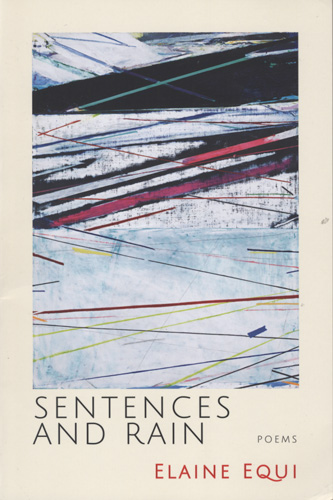Sentences and Rain
Elaine Equi’s latest book, Sentences and Rain, feels like a confident drift. There is so much control and purpose in the playful word ideas. She must be listed among many of the greats. The insights into humanity that are contained in each and every poem remind the reader of the wonder tucked in every corner of life. The words and format are gentle and full of utility. This is the way of those who hold the passage. Equi has pushed her pen for many years. The development is original and organic. One need not read Equi’s previous writing to get the impression that this is a writer and an observer of life in the peak of their critique. Elaine Equi’s latest book, Sentences and Rain, feels like a confident drift. There is so much control and purpose in the playful word ideas. She must be listed among many of the greats. The insights into humanity that are contained in each and every poem remind the reader of the wonder tucked in every corner of life. The words and format are gentle and full of utility. This is the way of those who hold the passage. Equi has pushed her pen for many years. The development is original and organic. One need not read Equi’s previous writing to get the impression that this is a writer and an observer of life in the peak of their critique. The critique is critical. The critique is also gentle and fun. It is full of intention and yet each word seems to hold the inner dawdle that every human carries.
One of the opening poems, “Black and White” ends with a profound statement:
The Garden of Eden
was black and white,
the color added later.
This statement is interesting for a poetry book that is full of colorful quips. It seems to announce that she knows this analyzing and beauty proceeding from her very pen is indeed part of the problem of the human existence. She muses in the very next poem that “If I Have Just One Word,” there would be a lot of possibility. And of course we all know this truth. Equi explores sounds and words to the fullest depth that she can.
The title poem bears a lot of weight early. It speaks to the direction of her personal trajectory. Her personal trajectory resembles that which most writers should be traveling. The growth and expansion, fullness that comes with aging.
The title poem speaks to the process quite directly:
The rain
waters
the sentences.The words
grow taller,
more supple.The sentences
previously
too drynow bend
and reach
toward meaning.
It is also simple and palatable. This is the mark of the high water crest. That language is reduced and there is vigor and tenacity in stripping something down to its most essential components and allowing it to freely float along in the universe. Many lines are funny, like in “Cut to the Chase”: “Somebody dumped sugar in her synthesizer.” But they get witty and zen-like when the lines realize themselves. “The busier they are, the more doesn’t happen.” This is out of context, yet totally within context. Equi’s writing in Sentences and Rain seem to have an awareness of the place that every line has in the greater whole of the book itself.
The same goes for many of the insights she presents. The insights show how slices of life look in the context and totality of life. The poem “Let’s Do Lunch” showcases two women out to lunch and the way they interact with one another, “[she] leans forward, encouraging, / nodding often.” But the final line of the poem shows the truth:“Neither of them eats / or drinks a thing.”
Equi is along on the journey for whatever purpose the journey throws at her. She mentions that many stories begin and/or are modeled after other stories, but it is the nature of the reader to follow the words, hoping and waiting for any variance. In that way, we are all scientists. We are participating in an experiment to see what variables hold and which ones change. This is when she begins to unleash the weird and unsettling. Because once you accept that life can be a weird navigation, the navigation gets weird. The poem “A Date with an Undertaker” would seem almost out of place against the rest of her work (the undertaker has relationships with the dead), but this would only be because the reader hasn’t eyed the natural development of thought and the poems that follow it.
“Reznikoff’s Clocks” is the sort of powerhouse poem that really shows how discipline and understanding can lift great writing into next level writing:
Our nightingale, the clock,
our lark
perched on the mantel
sings so steadily:
O bird of prey!
And: “these busy insects / are eating away my world” as well as “My hair was caught in the wheels of a clock / and torn from my head: see, now I am bald!” Every line is funnier than the last, and yet truer! Each poem in this collection does the same thing. They build in insight and delight. Sentences and Rain is truly a masterwork that deserves to be read and disseminated through the population and through time.





